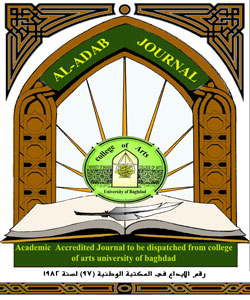Abstract
Arabic Literature has occupied a prominent position within world cultures, both past and present. In the past the literature reflected Arabs’ impact on medieval civilizations, starting from the emergence of Islam and the spread of Arabic language outside of Arabia. Following the death of the Prophet Muhammad (PBUH), Arabic literature became the repertoire of knowledge, values, and identities that were produced in countless pieces of poetry, prose, tales, fables, speeches, and letters.
This paper argues that throughout history there has been an inextricable relationship between Arabic literature and the type of politics that Muslims have produced, enabling them to spread the message of Islam and expand beyond their immediate geographical locations. Similarly, the various religious, language, and political contributions of Muslims in the few decades following the emergence of Islam have transformed Arabic literature into a pillar of world cultures, leading many non-Arabs to be attracted to and captivated by it.
A modern manifestation of this captivation is exemplified by the prize initiated by King Oscar II of Sweden and Norway, who established an Academy of oriental languages in the 19th century. In consultation with Sultan Abdul Hamid II and the men of letters in Istanbul, the academy started a prize dedicated to Arabic literature and culture. The prize was won by prominent figures of Arabic literature at that time, including Iraq’s Mahmud Shukri al-Alusi and Mauritania’s Muhammad Mahmud al-Shanqiti.
This paper will examine the context behind this almost forgotten episode of the interaction between Arabic and Western literatures and cultures, arguing that this prize can be seen as a precursor to the current discussion concerning Arabic literature in world literature paradigm.
This paper argues that throughout history there has been an inextricable relationship between Arabic literature and the type of politics that Muslims have produced, enabling them to spread the message of Islam and expand beyond their immediate geographical locations. Similarly, the various religious, language, and political contributions of Muslims in the few decades following the emergence of Islam have transformed Arabic literature into a pillar of world cultures, leading many non-Arabs to be attracted to and captivated by it.
A modern manifestation of this captivation is exemplified by the prize initiated by King Oscar II of Sweden and Norway, who established an Academy of oriental languages in the 19th century. In consultation with Sultan Abdul Hamid II and the men of letters in Istanbul, the academy started a prize dedicated to Arabic literature and culture. The prize was won by prominent figures of Arabic literature at that time, including Iraq’s Mahmud Shukri al-Alusi and Mauritania’s Muhammad Mahmud al-Shanqiti.
This paper will examine the context behind this almost forgotten episode of the interaction between Arabic and Western literatures and cultures, arguing that this prize can be seen as a precursor to the current discussion concerning Arabic literature in world literature paradigm.
Keywords
Arabic World Literature Site
King Oscar II’s Prize
The Period of Decadence
world cultures
Abstract
يتخذ الأدب العربيّ موقعًا بارزًا في الجغرافيا الثقافيّة العالميّة، وهو موقعٌ قديمٌ مُتجددٌ، فأمّا قدمه فيتصل في ارتباطه بأثر العرب ودورهم في المساهمة في مشروع الحضارة الإنسانية عن طريق الإسلام الذي استند على العنصر العربيّ الذي جسّد نموذجه البارز النبيُّ محمد – صلّى الله عليه وسلّم -. ومن خلال مقوّمات الثقافة العربيّة المتمثّلة في القوى البشريّة، والقيم الحضارية، والهويّة اللغوية المتمثّلة في اللغة العربية وآدابها ومعارفها ومذخورها الهائل في الشعر والنثر والقصص والحكايات والأساطير والخُطب، والرسائل.
تتأسس فرضية هذه الورقة على تصوّر مُفاده أنّ هناك ارتباطًا وشيجًا بين الأدب العربيّ والسياسات التي عبّر عنها الإسلام والمسلمون في التوسّع والسيطرة والانتشار ونشر الإسلام في أصقاع العالم القديم. فقد أدّت الإنجازات السياسيّة واللغويّة والبشريّة والدينيّة التي أحدثها المسلمون في نصف قرن من بدء دعوة النبيّ في مكّة إلى تعميق صورة الأدب العربيّ في خارطة الأدب العالميّ، ومن ثَمّ الافتتان بحضارة العرب وآدابها.
لذلك تسعى هذه الورقة بحث السياقات الــمُتّصلة بجائزة الملك (أوسكار الثاني Oscar II) ملك السويد والنرويج الذي أنشأ مجمعًا علميًّا للغات الشرقيّة في العقد الثامن من القرن التاسع عشر. وقد كان يمنح هذا المجمع جائزة مُخصصة لأدب العرب وحضارتهم، وذلك بالتنسيق مع (السلطان عبد الحميد الثاني) ورجال السلطة والفكر والحضارة في إسلامبول.
وقد حصل على الجائزة في سنة 1889 علاّمة العراق (محمود شكري الآلوسي)، وذلك عن كتاب ألّفه وفق معايير لجنة اللغات الشرقيّة في استكهولم، وهو كتاب: "بلوغ الأرب في معرفة أحوال العرب". ثم تبعه (الشيخ محمد محمود الشنقيطيّ)، وذلك عن قصيدة عصماء تحاكي قصائد الشعر الجاهليين نشرت في سنة 1901.
تتأسس فرضية هذه الورقة على تصوّر مُفاده أنّ هناك ارتباطًا وشيجًا بين الأدب العربيّ والسياسات التي عبّر عنها الإسلام والمسلمون في التوسّع والسيطرة والانتشار ونشر الإسلام في أصقاع العالم القديم. فقد أدّت الإنجازات السياسيّة واللغويّة والبشريّة والدينيّة التي أحدثها المسلمون في نصف قرن من بدء دعوة النبيّ في مكّة إلى تعميق صورة الأدب العربيّ في خارطة الأدب العالميّ، ومن ثَمّ الافتتان بحضارة العرب وآدابها.
لذلك تسعى هذه الورقة بحث السياقات الــمُتّصلة بجائزة الملك (أوسكار الثاني Oscar II) ملك السويد والنرويج الذي أنشأ مجمعًا علميًّا للغات الشرقيّة في العقد الثامن من القرن التاسع عشر. وقد كان يمنح هذا المجمع جائزة مُخصصة لأدب العرب وحضارتهم، وذلك بالتنسيق مع (السلطان عبد الحميد الثاني) ورجال السلطة والفكر والحضارة في إسلامبول.
وقد حصل على الجائزة في سنة 1889 علاّمة العراق (محمود شكري الآلوسي)، وذلك عن كتاب ألّفه وفق معايير لجنة اللغات الشرقيّة في استكهولم، وهو كتاب: "بلوغ الأرب في معرفة أحوال العرب". ثم تبعه (الشيخ محمد محمود الشنقيطيّ)، وذلك عن قصيدة عصماء تحاكي قصائد الشعر الجاهليين نشرت في سنة 1901.
Keywords
موقعُ الأدب العربيّ العالميُّ، جائزة الملك أوسكار الثّاني، الثقافات العالميّة، عصور الانحطاط
